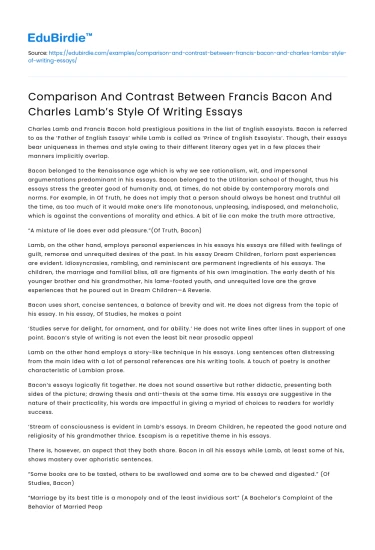Charles Lamb and Francis Bacon hold prestigious positions in the list of English essayists. Bacon is referred to as the ‘Father of English Essays’ while Lamb is called as ‘Prince of English Essayists’. Though, their essays bear uniqueness in themes and style owing to their different literary ages yet in a few places their manners implicitly overlap.
Bacon belonged to the Renaissance age which is why we see rationalism, wit, and impersonal argumentations predominant in his essays. Bacon belonged to the Utilitarian school of thought, thus his essays stress the greater good of humanity and, at times, do not abide by contemporary morals and norms. For example, in Of Truth, he does not imply that a person should always be honest and truthful all the time, as too much of it would make one’s life monotonous, unpleasing, indisposed, and melancholic, which is against the conventions of morality and ethics. A bit of lie can make the truth more attractive,
Save your time!
We can take care of your essay
- Proper editing and formatting
- Free revision, title page, and bibliography
- Flexible prices and money-back guarantee
“A mixture of lie does ever add pleasure.”(Of Truth, Bacon)
Lamb, on the other hand, employs personal experiences in his essays his essays are filled with feelings of guilt, remorse and unrequited desires of the past. In his essay Dream Children, forlorn past experiences are evident. Idiosyncrasies, rambling, and reminiscent are permanent ingredients of his essays. The children, the marriage and familial bliss, all are figments of his own imagination. The early death of his younger brother and his grandmother, his lame-footed youth, and unrequited love are the grave experiences that he poured out in Dream Children—A Reverie.
Bacon uses short, concise sentences, a balance of brevity and wit. He does not digress from the topic of his essay. In his essay, Of Studies, he makes a point
‘Studies serve for delight, for ornament, and for ability.’ He does not write lines after lines in support of one point. Bacon’s style of writing is not even the least bit near prosodic appeal
Lamb on the other hand employs a story-like technique in his essays. Long sentences often distressing from the main idea with a lot of personal references are his writing tools. A touch of poetry is another characteristic of Lambian prose.
Bacon’s essays logically fit together. He does not sound assertive but rather didactic, presenting both sides of the picture; drawing thesis and anti-thesis at the same time. His essays are suggestive in the nature of their practicality, his words are impactful in giving a myriad of choices to readers for worldly success.
‘Stream of consciousness is evident in Lamb’s essays. In Dream Children, he repeated the good nature and religiosity of his grandmother thrice. Escapism is a repetitive theme in his essays.
There is, however, an aspect that they both share. Bacon in all his essays while Lamb, at least some of his, shows mastery over aphoristic sentences.
“Some books are to be tasted, others to be swallowed and some are to be chewed and digested.” (Of Studies, Bacon)
“Marriage by its best title is a monopoly and of the least invidious sort” (A Bachelor’s Complaint of the Behavior of Married People, Lamb)
Both writers make use of allusions and quotations, but the difference lies in the method of use. Bacon uses allusions to weigh his point of view while Lamb uses them casually not to weigh his point but to share an experience.
Conclusively, Lamb was very much moved by the rise and fall of his life and thus, his essays are personal in nature, filled with whims and personal likes. Bacon, on the other hand, is impersonal and rational as an essayist. He states his ideas confidently in the tersest of language.
Bibliography
- Dream Children --A revery by Charles Lamb
- Of Truth by Francis Bacon
- Of Studies by Francis Bacon






 Stuck on your essay?
Stuck on your essay?

